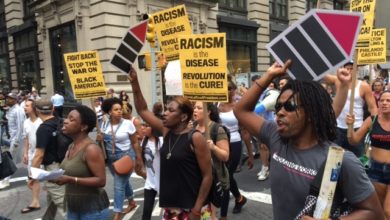On April 25, hundreds of people gathered in Mitchel Square Park in the Washington Heights neighborhood of New York City for a rally in solidarity with the Asian community, after Yao Pan Ma, a Chinese man collecting cans for recycling, was brutally attacked and hospitalized just a couple of days earlier.
The rally’s organizers included the New York State Nurses Association, MayDay Space, Asians 4 Abolition, BAYAN USA, Word Up Community Bookshop and the ANSWER Coalition. The community showed up to protest the anti-Asian violence perpetrated not only by civilians, but also by the police, corporate media, and the U.S. armed forces abroad.

Some of the rally’s speakers cited the staggering statistic that New York City has seen a 1,900% increase in recorded hate crimes against people of Asian descent between 2019 and 2020. Organizers linked this spike in anti-Asian violence to the history of U.S. imperialism in the Asia Pacific.
“Asian Americans in this country, we are being scapegoated,” Rachel Hu of the ANSWER coalition explained. “We are being scapegoated for the U.S. military ambitions abroad. And the reality is, when we talk about anti-China propaganda, that’s anti-Chinese people propaganda, and that is coming back on us.”
To combat the rise in anti-Asian sentiment, speakers underscored the necessity of cross-racial worker solidarity in the face of division sowed by the ruling class.
Rapper Immortal Technique spoke to the establishment and the media attempts to pit Black and Latino workers against the Asian working class, cynically aiming “to hire one half of the poor to fight the other half, and we are tired of being suckered into that!”
Solidarity statement from Mumia Abu-Jamal
The rally had a surprise guest speaker. Renowned political prisoner Mumia Abu-Jamal, called in from a hospital bed in Pennsylvania just days after heart surgery. He also emphasized the need for unity at this critical time. “Only a determined, multinational, global movement can beat back the forces of anti-Asian hatred, and it must be done. It must be done now,” asserted Abu-Jamal.
The rally was held just a block from the former Audubon Ballroom, where Malcolm X was shot and where Yuri Kochiyama cradled him as he took his last breaths. Here, Abu-Jamal referenced the solidarity shown by Kochiyama — not just in that moment, but throughout her life as a freedom fighter. “From that point on,” continued Abu-Jamal, “to her long and remarkable life, [Kochiyama] championed Asian and Black unity, solidarity.”
The crowd then left the park and began marching toward Harlem chanting “No justice, no peace, no racist police,” among other sentiments opposing police brutality and calling for Black-Asian solidarity.
As the march neared Harlem, they made a stop for another rally. There, Nicole Henriquez of Flushing spoke about the killing of her cousin Christian Hall by Pennsylvania State Police. Henriquez demanded that the police release the footage of her cousin’s killing and urged the crowd to stand together against injustice. “It shouldn’t be one community versus another,” Henriquez asserted. “It should be all of us fighting for one good, which is against racism, systemic racism, police violence.”
Diane of Asians 4 Abolition provided critical context on the history of Asian people in immigrant struggles: “We reject the detention of border crossers everywhere, knowing that the Page Act and the Chinese Exclusion Act in the late 19th century set the mold for contemporary U.S. anti-immigrant policy.” Immigration rights remain a key issue for many Asian communities in the United States. For instance, on March 15 the Biden administration unlawfully deported 33 Vietnamese people, many of them refugees of the devastating U.S. war waged in Vietnam.
The march then continued on to 125th St. and 3rd Ave., the corner where Ma was attacked, to observe a moment of silence. It eventually ended at the People’s Church in East Harlem.







